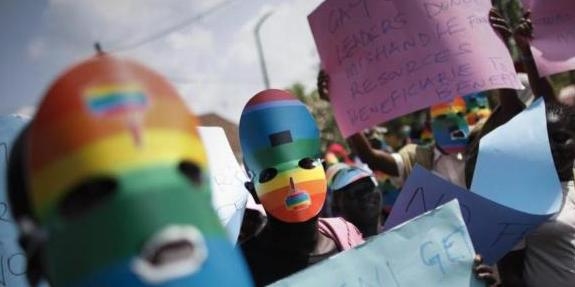ZAM Chronicle’s lead article The Ugandan Family on the Anti-Homosexuality Laws in Uganda expresses the hope that ‘it will pass’: that times will change again. It shows that many Ugandans may be homophobes, but they don’t necessarily legislate against, harass, evict, disown and beat up gay people. Until recently, the situation in Uganda was more or less comparable with any other traditional country -or with the UK in the 1950’s.
The Anti-Homosexuality Act was created and pushed by President Museveni. He wants another term in power. He needs his poverty-ridden people to overlook malaria and childbirth deaths, former child soldiers vegetating in the North, high school leavers who can barely read and write, and massive theft by government officials of moneys that should train teachers and nurses, build clinics and support small businesses. There is one tried and tested recipe to get a plagued, resentful people to direct their anger elsewhere: hate speech.
It wasn’t only gays who were the targets. Women have been publicly attacked, too. The equally new ‘Anti-Pornography Laws’ that legislate against ‘public sexual excitement,’ encouraged vandals and louts to ambush, and publicly undress, women in miniskirts.
Museveni has very skilfully deflected seething anger among many in the shanty towns towards ‘indecent’ people who ‘threaten Ugandan culture and religion’. Religious missionaries from the US, seeking docile flocks where their own were thinning out and trying to build these as a power base against modernity in the West –and against Islam-, had come to help. Together, they, Museveni and associated local pastors, cemented the fear of perversions and ungodliness.
It didn’t matter for learned Ugandans to point out that no Ugandan culture allows for harassing women in the street. That many culture’s traditional dresses are, well, miniskirts. That gay people had always existed in Uganda and people of all genders and sexual orientations had lived peacefully together, even if attitudes were conservative and sexuality was not something that was openly spoken about. Scapegoats had been found.
What played right in the hands of Museveni was that he could give the scapegoating campaign a patriotic edge. It is ‘the (modern) West’ that is perverted, ‘the West’ that preys on Ugandans and ‘turns’ them gay, the West that threatens ‘our families’ and ‘our society’. And The West, foolishly, had made it worse by focusing heavily on gay rights (and not a single other issue, like malaria deaths and a failing school system) as a precondition for continued development aid. In doing so, ‘the West’ was making Uganda’s gay sons and daughters responsible for cut aid to orphanages. Researcher and author Helen Epstein noted how ‘even some Ugandan gay activists began quietly urging the diplomatic community to stop singling out the rights of gays while ignoring the plight of other Ugandans.’
Museveni will probably win the 2016 elections. But many Ugandans are standing by their loved ones, the anti-gay law is being challenged in court as unconstitutional and activists are calling for (well-targeted) international solidarity. This may help. It is after all a well-known fact that leaders are not born the way they are, but can change under pressure.


